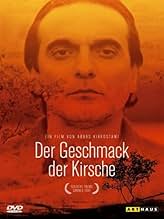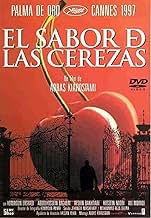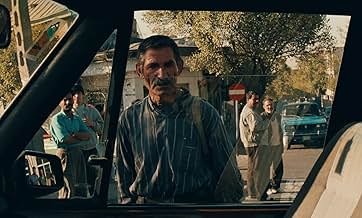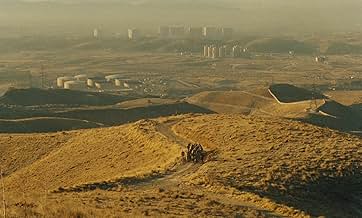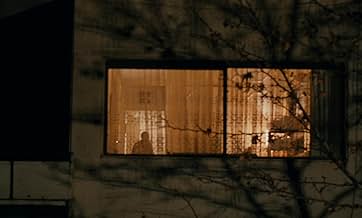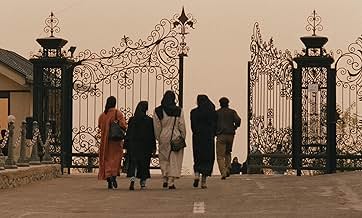एक ईरानी व्यक्ति ट्रक चलाते हुए किसी ऐसे व्यक्ति की तलाश में निकालता है जो उससके आत्महत्या करने के बाद उसे चुपचाप चेरी के पेड़ के नीचे दफना दे.एक ईरानी व्यक्ति ट्रक चलाते हुए किसी ऐसे व्यक्ति की तलाश में निकालता है जो उससके आत्महत्या करने के बाद उसे चुपचाप चेरी के पेड़ के नीचे दफना दे.एक ईरानी व्यक्ति ट्रक चलाते हुए किसी ऐसे व्यक्ति की तलाश में निकालता है जो उससके आत्महत्या करने के बाद उसे चुपचाप चेरी के पेड़ के नीचे दफना दे.
- निर्देशक
- लेखक
- स्टार
- पुरस्कार
- 3 जीत और कुल 5 नामांकन
फ़ीचर्ड समीक्षाएं
The pace is quite slow, and the director takes no pains to explain or clarify anything. We follow a man as he tries to enlist the help of ordinary people in carrying out a dark plan. The movie is about the interactions between humans, about the joy of life - the taste of a cherry - seen through the eyes of a desperate man. Not all the questions are answered, and not all the pieces of the puzzle are filled. I guarantee you'll discuss this movie for at least several hours after you see it.
"The Taste of Cherry" is a metaphor for the sweet taste of life only someone at the edge of death can truly appreciate, like a beautiful sunset, a colorful sunrise, the sight of children playing and smiling, a comforting thought, any sign of kindness... which the film is stingy of, deliberately, until its final act. Abbas Kiarostami doesn't paint the canvas of a happy nation because its focus is the sad face of a man named Mr. Badil, selfishly resigned to commit suicide and looking for someone to bury his corpse after he finds him dead in a pre-digged hole. Everything's planned except for that last formality.
To use a hackneyed expression, the destination here doesn't matter, only the car journey of a man trying to pick up a helper to fulfill his last wish. Over the course of this sad odyssey, he'll meet a young and shy soldier from Kurdistan, an Afghani seminarian and an aged taxidermist, the young man feels entrapped in a situation whose awkwardness go beyond the realm of ordinary problems he's used to live. The second embodies the religious side of the story and expectedly reminds Badil that suicide is taboo in religion and wouldn't make himself an accomplice, his tone is not preachy but rather amiable and friendly.
But Badil is a stubborn man, and for each argument finds a verbal counterattack, a job is a job, why would a poor man refuse the opportunity of a six-month wage for burying a corpse. Why would God punish someone whose unhappiness will only cause more harm to the beloved ones? Still, the tone changes and Badil gets more eloquent until he finds the wise old man who embodies our own vision: life is just too precious and valuable, he evokes what makes things worth to live, he tells a joke, he sings but finally agrees to do the job, hoping that Badil will do the right choice and choose not to kill himself.
Let's get back to Badil and more importantly, the car, which is inseparable from the story, as both a means to a morbid end and its paradoxical obstacle. The car is his life, it represents the only zone of comfort left in his supposedly meaningless life, through the windshield, he offers us a glimpse of a seldom seen Iran, not too religious, struck by employment, full of life and can only offer his Range Rover as a sign of his wealth, completely oblivious to the social realities of his own country. Badil doesn't even realize that his invitations sound like sexual pick-ups in a country where homosexuality is more taboo than suicide. He never finds the proper words to get to the point, maybe too focused on the road, to be able to empathize with his passengers' point of view. The car is his life, the road is his death.
But we're embarked as passengers in the car of life and from the regular external shots of the car driving through the deserted area, we see that the man is circling around the same road, and understand how truly lost he is. Badil the man in the car is hard to like and it's only after he meets the old man that he wises up a little, leaves the car and seems to have clear directions. Before, he joined a guardian up his little tower and enjoyed the sight while the guardian deemed it as dust and earth. For once, it's Badil who sees the half-full glass, all good things come from dust and earth, the guardian says everything gets back to dust. Outside the car, Badil can taste a few things, if not cherries, in the car, he doesn't even acknowledge the help of the workers who gave him a lift when one wheel fell near a ravine.
Kiarostami plunges us in the mind of someone who doesn't know where to go, it's not much a study on Badil but on the state of mind of suicidal persons. The film demands some patience and I'm not sure the ending rewards it but I guess it conveys the same sense of nothingness inherent to the lost soul. The ending is rather brave in the way it polarizes viewers but as someone who went through the same questioning, I know suicide is no kidding matter and I could feel the pain of Homayoun Ershadi, his desperation, his anger, his sadness, and after the man accepted to do the job, the realization that it was up to him now.
Whether he succeeded or not belongs to another movie and I'm not sure I would have loved a clear ending, in a way a satisfying study ends when the arc is fully closed, but the real focus isn't the driver, or the car, but the road. I know road movies can be wonderfully existential so this is a film that gets the perfect setting and road to contain these states of mind.
I used the word "existential dead end" for movies like "Magnolia" and "The Diving Bell and the Butterfly", the expression can apply for Badil's road. The whole irony is that as long as we can pick up passengers, no road will lead to a dead end.
Simple but not simplistic, complex but not complicated, straightforward in a circular way, the 1997 Golden Palm Winner is a special movie, not easy to watch but fascinating to contemplate.
Suicide, in itself, is a ready and obvious turn-off for many viewers, probably. And coupled with the apparent treacle-like pace of the narrative and the repetitive scenes of a lone man, Badii (Homayoun Ershadi), driving in and around hills outside Tehran, this story gives a whole new dimension to the idea of going over the same ground, again and again, to prove a point. And all the while we, as viewer, are inside the auto for most of this movie, up close and very personal....
But to avoid seeing this movie would be a big mistake, in my opinion.
I say that simply because the idea of suicide has probably occurred to most people, including myself, at some time in their lives. Whether that idea was part of Kiarostami's motivation for making this movie, we will never know, of course. I dare say it occurred to him, though.
At the first frame, we're in Baddii's well-worn Range Rover as he drives, his face set, his gaze wandering here and there, searching for a likely assistant for his plan to kill himself. In sequence, he stops a variety of men - a seminarian, a young soldier, a security guard; each man and Badii converse about his need to have somebody help him to suicide, Badii describing what a helper must do. Each time, Baddi has no success until, with a blindingly quick jump-cut, an old man, Bagheri (Abdolrahman Bagheri) is in the car, a helper who finally agrees to abide by Badii's wishes.
So, after taking Bagheri to close where he lives, Badii drives off, content that he has secured a deal; rapidly, however, he drives back in a fluster, as doubts creep into his mind. Frantically, he walks around the area until he finds the old man Bagheri to seek further assurance he will indeed help Badii next morning. Somewhat annoyed, the old man again gives his solemn promise. And stalks off.
Slowly then, Badii returns to his home/apartment, makes his final preparations, makes a point of turning off all the lights as he leaves, locks the door, leaves his car, and then takes a taxi back to the cherry tree, he had previously selected, at which he will terminate his life during the night, and as thunderstorms - a much-overused trope perhaps - begin.
It is there, then, that I will leave you to find out why Bagheri decided to help, and about Badii's fate that night. And about an absolutely unexpected ending.
It's a bleak story, but one that is played out in too many ways by thousands every day, more or less in every country on the planet, probably. Perhaps then, Kiarostami is urging us to think upon that more often as we all traverse our own daily ups and downs - and especially in relation to those who are nearest. Once seen, this is not a movie to forget.
Recommended for all, except toddlers obviously. Give it eight out of ten.
There are critics who call this kind of untouched-by-art realism genius, who say that Kiarostami is making us think, reconsider the very nature of cinema, and so on. To my mind, the message of the film-- the taste of cherry makes life worth living-- is no more or less profound than, say, Woody Allen rattling off a few of the things that make life worth living in Manhattan, or the epiphany the kid in American Beauty gets from a plastic bag. (Likewise the message that it's all only a movie. Never woulda guessed.) And critics who find such a message shallow in a piece of slick entertainment, but deep when it's in a deliberately unentertaining art film, need to reexamine their critical principles, or lighten up a little-- or at least go see again the work of real art Kiarostami alludes to in his title, Wild Strawberries, which has more depth of characterization and emotional richness in any five minutes than this manages to scrounge up in an hour and a half.
क्या आपको पता है
- ट्रिवियाThe film was shot without a proper script, relying on improvisations.
- गूफ़In the opening scene, as Mr. Badhi is driving past laborers looking for work, the same middle-aged white haired man, wearing a checkered sweater vest, is seen twice.
- भाव
Mr. Bagheri: If you look at the four seasons, each season brings fruit. In summer, there's fruit, in autumn, too. Winter brings different fruit and spring, too. No mother can fill her fridge with such a variety of fruit for her children. No mother can do as much for her children as God does for His creatures. You want to refuse all that? You want to give it all up? You want to give up the taste of cherries?
- कनेक्शनFeatured in Especial Cannes: 50 Anos de Festival (1997)
टॉप पसंद
- How long is Taste of Cherry?Alexa द्वारा संचालित
विवरण
- रिलीज़ की तारीख़
- कंट्री ऑफ़ ओरिजिन
- आधिकारिक साइटें
- भाषा
- इस रूप में भी जाना जाता है
- Taste of Cherry
- फ़िल्माने की जगहें
- उत्पादन कंपनियां
- IMDbPro पर और कंपनी क्रेडिट देखें
बॉक्स ऑफ़िस
- दुनिया भर में सकल
- $11,207
इस पेज में योगदान दें



